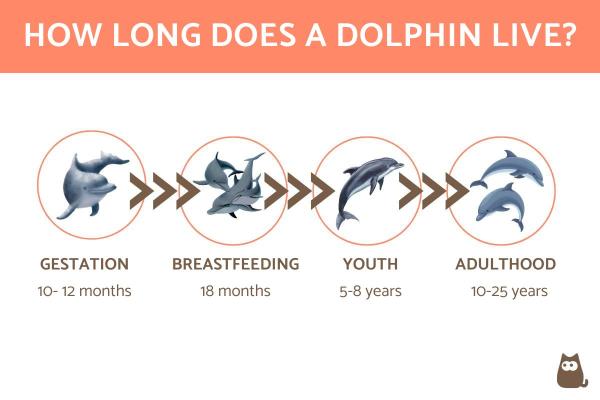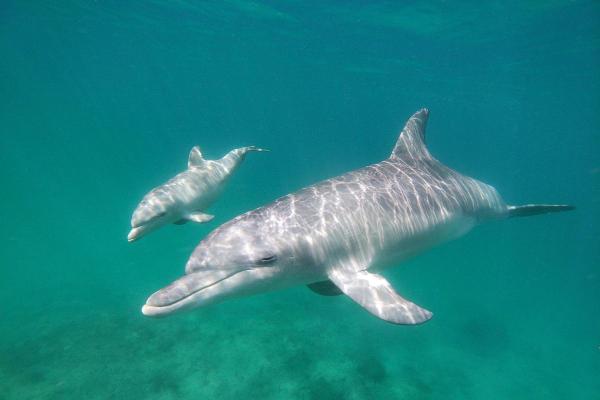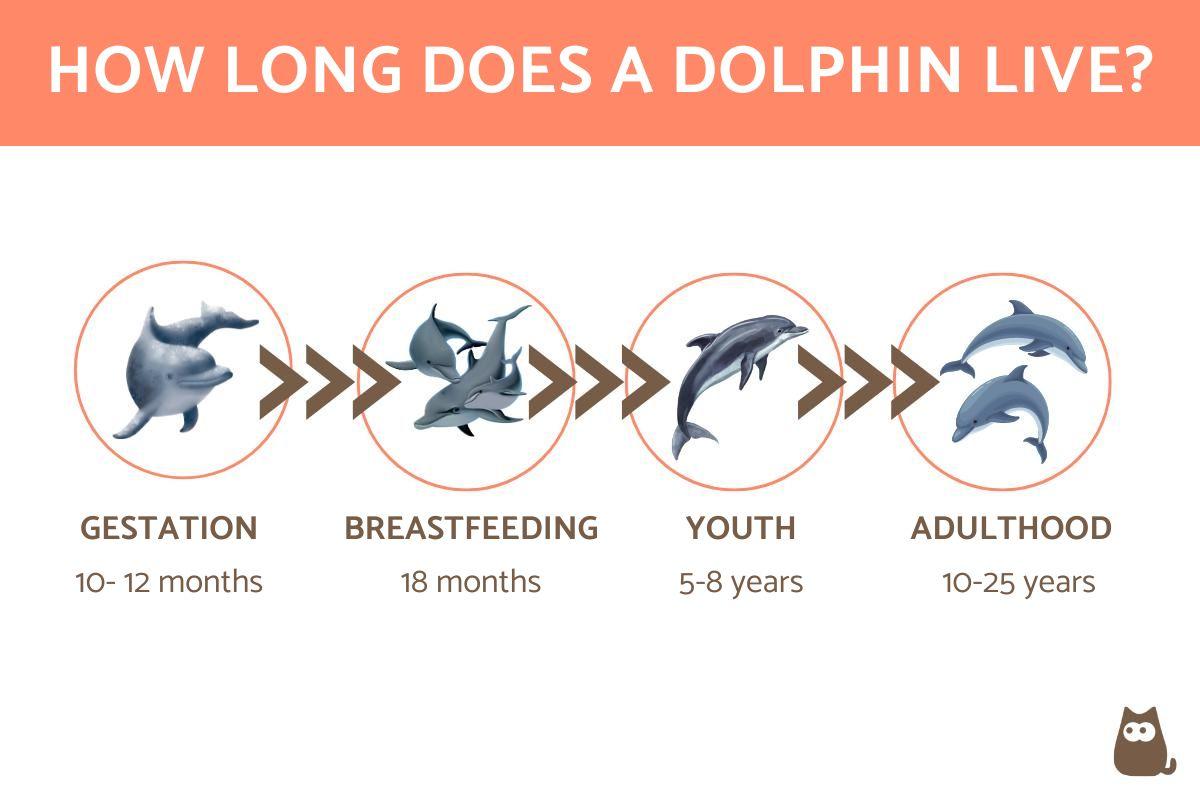How Long Do Dolphins Live?


Dolphins are fascinating aquatic mammals that belong to the toothed whale family (Odontoceti) within the cetacean group. Dolphins are found in oceans, seas, and some rivers and estuaries around the world. Different species have adapted to thrive in a variety of aquatic environments. However, while not all dolphins are endangered, several species face threats due to human activities.
In the following AnimalWised article, we explore the lifespan of dolphins, the threats they face and the factors that influence their lifespan.
Dolphin life cycle
The life cycle of dolphins is a fascinating process marked by several distinct stages, each with its unique characteristics. Here is an overview of the dolphin life cycle:
- Gestation: dolphin gestation typically lasts between 10 and 12 months. Dolphins are viviparous, meaning their embryos develop inside the mother's body, resulting in live births. Females usually have one reproductive season per year, with intervals between births typically around three years.
- Birth: dolphins are viviparous, meaning they give birth to live young. The embryo develops inside the mother's body. At birth, dolphins can swim and move independently but rely on their mothers for nourishment and learning essential behaviors like hunting and predator avoidance.
- Breastfeeding: the nursing period can last around 18 months, though this duration varies by species. During this time, the mother is solely responsible for the care of the calf.
- Youth: juvenile dolphins remain with their mothers and their social group. Dolphins are highly sociable, and female dolphins often support each other in calf-rearing. Sexual maturity varies, with females typically becoming reproductively mature around 5 years old and males around 8 years old, although these ages can differ among species.
- Adulthood: as adults, dolphins fully integrate into their social groups, which may include different subgroups for calves, juveniles, and adult males. Dolphins exhibit complex social behaviors, including cooperative hunting, play, and diverse communication methods.
Curious about the incredible adaptations that allow dolphins to thrive underwater? Dive deeper with our article on dolphin characteristics.

How long does a dolphin live in the wild?
The lifespan of a dolphin in the wild depends on the species and environmental conditions. In general, most dolphin species live somewhere between 20 and 40 years, but bottlenose dolphins, for example, can live up to 60 years in the wild, with females tendening to live longer than males.
To illustrate the range of lifespans, let's explore the average lifespan of some dolphin species in their natural habitat.
- Risso's Dolphin (Grampus griseus): 30 years
- Common Dolphin (Delphinus delphis): 20 years
- Bottlenose Dolphin (Tursiops truncatus): 25 years
- Peale's Dolphin (Lagenorhynchus australis): 13 years
- Australian Snubfin Dolphin (Orcaella heinsohni): 20 years
- Rough-toothed Dolphin (Steno bredanensis): 32 years
- Amazon River Dolphin (Inia geoffrensis): 30 years
- Baiji (Lipotes vexillifer): 24 years
- South Asian River Dolphin (Platanista gangetica): 28 years
- La Plata or Franciscan Dolphin (Pontoporia blainvillei): 16 years
While genetics, environment, and ecology all influence a dolphin's lifespan, the greatest threats to their longevity come from human activities. Dolphins face various natural challenges, but pollution and habitat disruption caused by humans pose a far greater risk. This means dolphins in cleaner, less disturbed waters tend to live longer, healthier lives.
Sadly, not all dolphin species are thriving. Learn about the dangers some dolphins face in our article on vulnerable dolphin populations.
How long does a dolphin live in captivity?
Due to their intelligence and trainability, dolphins have been captured over time for the purpose of training and exhibiting them at events in water parks and zoos. However, the impact of captivity on dolphin lifespan is complex. While some factors, like consistent veterinary care, regular food supply, and the absence of natural predators, might suggest a longer lifespan in captivity, this isn't always the case.
On average, dolphins in captivity live for about 28-29 years. This is an improvement from past decades, but it's still shorter than their lifespan in the wild, which can reach 40 years or more for some species. Research suggests factors like limited space, lack of natural stimulation, and stress from captivity can contribute to a shorter lifespan.
Wild dolphins have the advantage of hunting and foraging, which stimulates their natural behaviors and provides a varied diet. In contrast, dolphins in captivity are usually fed a controlled diet consisting mainly of fish, often supplemented with vitamins. While this ensures they receive adequate nutrition, it may lack the diversity found in their natural diet. Additionally, the act of hunting itself is important for their physical and mental health, which is often missing in captivity.
In the wild, dolphins form dynamic social networks that can change over time. In captivity, however, the social environment is often limited to a fixed group of individuals, which can lead to social stress and aggression if the group dynamics are not carefully managed.
Dolphins are highly intelligent and social animals that thrive in the wild. Captivity should ideally be limited to strict conservation purposes or when they are rescued and require special care. In captivity, it is essential to provide conditions that ensure their well-being. This includes spacious environments and enrichment activities that mimic their natural habitat. Being confined to small spaces, like pools or ponds, can cause significant stress and negatively impact their quality of life.
How long does a dolphin live out of water?
Dolphins are aquatic mammals adapted to live in water. They can only survive out of water for a few hours, as long as they are kept wet and in minimally adequate conditions. A dolphin cannot live long out of water because water is essential for regulating its temperature and preventing dehydration, which are crucial for an aquatic animal.
Additionally, while dolphins can still use their blowhole to breathe when out of water, they are severely limited in movement and can suffer from stress and physical harm if not quickly returned to their aquatic environment.
Dive deeper into the fascinating world of dolphin reproduction in our related article.
If you want to read similar articles to How Long Do Dolphins Live?, we recommend you visit our Facts about the animal kingdom category.
- Myers, P., R. Espinosa, CS Parr, T. Jones, GS Hammond, and TA Dewey. (2024). The Animal Diversity Web. Available at: https://animaldiversity.org.
- Poor, A. (2005). Cetacea . Animal Diversity Web. Available at: https://animaldiversity.org/accounts/Cetacea/
- Smith, C. (2023). Delphinidae . Animal Diversity Web. Available at: https://animaldiversity.org/accounts/Delphinidae/
- https://ammpa.org/






